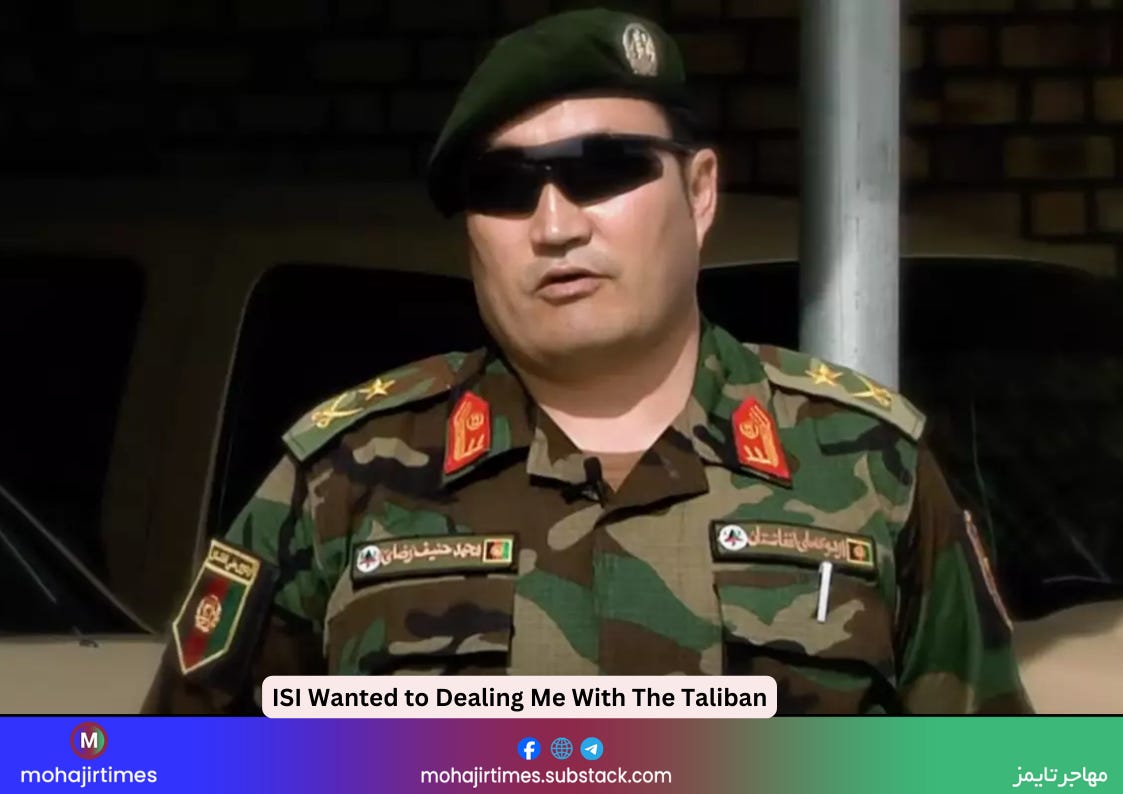ISI Wanted to Dealing Me With The Taliban
Mohajir Times’ interview with Hanif Rezaei, a former member of the Afghan National Army and the spokesman of the 209th Shaheen Corps
Interviewer: Aman Shadkam
The fall of the system of the Republic of Afghanistan caused hundreds and thousands of Afghans to leave their country and embark on arduous paths of migration. Many of these refugees were the Afghan National Army and Security Forces. Most importantly, the military staying in Afghanistan was and still is gaming and dealing with their life. Therefore, some soldiers who left Afghanistan are not safe from a peaceful and trouble-free life in the second and third countries, especially in countries like Pakistan, Turkey, and Iran. Also, these countries have some kind of interaction and political relations with the Taliban group, and the immigration of former military personnel in these countries is another problem.
In the interview, we follow the words of Mr. Hanif Rezaei, the former spokesperson of the 209th Shaheen Army Corps in northern Afghanistan, who migrated to Pakistan and then to Iran after the fall of the Republic of Afghanistan. He talks about the flow of transactions that the event of August 15, 2021, imposed on the people of Afghanistan and the security forces, as well as the hardships and stories of his life in the world of displacement and migration.
Shadkam: Mr. Rezaei, when and in which country did you go when the Taliban re-occupied Kabul?
Rezaei: The military, especially the Afghanistan army, did not imagine that Kabul would fall into the hands of the Taliban so easily until the 90th minute because it was more advanced than other provinces in every respect. But on August 23, 2021, I left Afghanistan for Pakistan in the form of smuggling. I stayed in Pakistan for a while, and unfortunately, I was arrested and imprisoned by the forces of the Pakistan Inter-Services Intelligence (ISI) by the informants of relatives in Quetta, Pakistan. I was in Pakistan’s ISI jail for more than four months. My hands and eyes were always closed with plastic, and they only opened my eyes during interrogation. They thought I was an Afghanistan Ministry of National Defense Intelligence member. Also, I completed my military education in India, and I have come here to disrupt security by India.
One day, I was taken to an underground, and a military general came and asked me to reveal the details of the Afghanistan commandos and generals who had arrived in Pakistan. He even told me that if I gave them their details, my and my family’s security would be provided. He also promised me the best life in Pakistan. But I, in response, told him that my life was not sweeter than theirs. Also, I don’t know where they went after those changes and events, and I have no idea or any clue. Then, the forces of the ISI organization beat me up and put me under severe mental and emotional pressure. Because of those beatings and mental pressures, I now have a memory problem, and I suffer a lot because of it.
Shadkam: Mr. Rezaei, how did you get released from ISI jail and immigrate to Iran again?
Rezaei: When ISI didn’t find a clue about me, they brought me from Pakistan to the Spin Boldak border to exchange me with a member of Tehreek-e-Taliban-e-Pakistan “TTP.” One of the Taliban commanders said in Pashto: “Today, for many reasons, an exchange cannot occur.” They still did not hand me over to them. After a few days, I was deported from Pakistan without a deal. I entered Afghanistan under a pseudonym and stayed in Bamyan for one month and in Daykundi for another month.
But my family members were always harassed by the Taliban. They used to come behind the gate and say where Rezaei is. We know that he is back from Pakistan. One day, I was at home, and I realized that the Taliban surrounded the house. I saved myself from the scene by wearing a Chadar veil. But they took my brother-in-law to the police station, and I ran away to Iran. But the Taliban did not release my brother-in-law. Finally, I asked the elders of the region to intervene because my brother-in-law is underage and cannot tolerate prison and torture. After the mediation of the elders, the commander of the “security station” checkpoint asked for a bribe in exchange for the release of my brother-in-law. We were also forced to pay for his release.
Shadkam: How is migration life going in Iran, and what are you doing?
Rezaei: I came to Iran on April 7, 2022. Of course, before coming here, even though I had not come to Iran, I knew that the situation of Afghanistani migrants in Iran was not very good. Even their rights as immigrants are not discussed, and they are treated like outcasts. However, I did not expect so much that in Iran, as a refugee, I would enjoy the rights that the United Nations and human rights have put forth. The problems and hardships that I saw and endured in Iran- I had never experienced in my entire life. The Iranian police had a racial attitude towards me. I went to the Immigration Police Department to get a residence permit, but they transferred me to the IRGC, where they took my details and only said that they would prevent my deportation. But you have no right to participate in political activities.
I had always worked in the military and did not know any art of manual work. For this reason, I worked twelve hours a month in a carpentry workshop for eight million tomans, equivalent to $160. I left that job because I didn’t know how. I was engaged in another job, which was tiring and exhausting. I stayed there for three months and left because it was exhausting, and the employer also underpaid my salary. In Iran, there is no department or comprehensive center for Afghanistan migrants to file lawsuits, and I would like to claim my salary rights. Right Now, I work in a stone-cutting factory but still face economic problems. Of course, this situation is not only on me, but most Afghanistan immigrants are facing such a problem in Iran. Afghan migrants are deprived of even the small blessings of humane behavior, let alone their other disadvantages and hardships. But there is no solution except to endure all this pain, suffering, poverty, and racism.
Shadkam: Dear Rezaei, tell us about the day when the Taliban occupied Kabul; where exactly were you, and what were you doing in those days?
Rezaei: One night before the fall of the army and system, I was on duty in the Pul-e-Charkhi prison in Kabul. That night, the Taliban prisoners started rioting and violence inside the prison. We were trying to prevent this violence from escalating and to stop it as soon as possible. But on the same night, I found out that “Criminals and dangerous Taliban accused are being taken out of Pul-e-Charkhi prison by government helicopters.” But I didn’t know where they were being transferred. The next night, I was in the 111 division of Kabul. This division, “Military Unit,” was in a state of misfortune and confusion. We had no idea what to do. Finally, an emergency meeting was held, and after the meeting, I radioed and contacted the spokesperson of the Ministry of National Defense of Afghanistan (Rohullah Ahmadzai) and even contacted his deputy (Fawad Aman), but they did not answer. We had to contact our friends at the Ministry of National Defense again, and they described the situation as critical and told us to get out of the military bases as soon as possible and go to safe places.
Shadkam: Mr. Rezaei, Do you think it was possible that the Security-minded forces would have moved from Kabul to strategically inaccessible places to stand and resist the Taliban without Ashraf Ghani and American troops?
Rezaei: No! The possibility was very low Because all the soldiers, officers, and experts in the army were shocked. Military rules are such that they must be followed according to pre-planned orders. The military of Kabul city did not have this preparation or even the idea that the Taliban would come to Kabul to stand against them. On the assumption that if they had pushed the special forces, commando, and army to a safe place, they would have faced two difficult deadlocks. One is the problem of financial and logistical support, and the other is the problem of psychological pressure, that is, the fear of killing their family members.
Shadkam: Thank you. In conclusion, if you say very briefly, You worked in different positions in the army and were also the spokesperson of the 209th Shaheen Corps in northern Afghanistan. In your opinion, what were the most important factors of the downfall of the Afghan National Army?
Rezaei: This issue can have various reasons and requires more analysis. But what has been evident is that the recent appointments by Ashraf Ghani had dealt a fatal blow to the pillars and system of the Afghan National Army. He had appointed commanders and generals unfamiliar with the warfare processes and the army’s defense and combat system. Also, some of them may have had a deep connection with the Taliban and terrorist groups.





